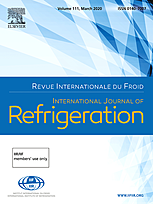
Summary
The food and beverage industry is the largest manufacturing sector in the UK. Food cold chains are energy intensive and use high global warming refrigerants. The aim of this work was to benchmark the existing UK cold chain and provide robust evidence-based data on greenhouse gas (GHG) emissions in 2019. Only emissions from refrigeration within UK borders was considered. Both Scope 1 emissions from refrigerant leakage (fugitive) and diesel for the transport refrigeration units (TRUs) as well as Scope 2 emissions from electrical power usage were estimated. These were estimated to be 12.9 MtCO2e per annum which represents 3.5% of the total UK annual territorial GHG emissions. Eighty-three percent of the Scope 1 emissions were fugitive, and 56% of these were from retail refrigeration. Agriculture and fisheries were the sectors with the lowest fugitive emissions accounting for only 3.7% of the total. Scope 2 emissions accounted for 54% of the emissions and tended to increase towards the consumer end of the cold chain, with 1.5% in agriculture and fisheries and 38% in domestic refrigeration. The FAOSTAT value of GWP used for f-gas emissions is not representative of UK emissions. UK government statistics may be underestimating domestic refrigerator emissions as they are not using real life energy consumption.
Available documents
Format PDF
Pages: 297-303
Available
Public price
20 €
Member price*
Free
* Best rate depending on membership category (see the detailed benefits of individual and corporate memberships).
Details
- Original title: Carbon emissions from refrigeration used in the UK food industry.
- Record ID : 30031729
- Languages: English
- Subject: Figures, economy, Environment
- Source: International Journal of Refrigeration - Revue Internationale du Froid - vol. 150
- Publication date: 2023/06
- DOI: http://dx.doi.org/10.1016/j.ijrefrig.2023.01.022
Links
See other articles in this issue (30)
See the source
Indexing
-
Themes:
Cold chain, interfaces;
Refrigerated transport: general information;
Refrigerated transport: economics and statistics;
Refrigeration and perishable products: economics and statistics;
Refrigerated storage: economics and statistics;
Supermarkets, display cabinets;
General information on environment (climate change, ozone depletion…) - Keywords: Cold chain; United Kingdom; CO2 emission; Food industry; Agricultural application; Cold storage; Refrigerated transport; Retail trade; Household refrigerator; Energy consumption; Electricity
-
The sustainability of the food cold chain. Part...
- Author(s) : SARR J., TOUBLANC C., DUPONT J. L., GUILPART J.
- Date : 2023/08/21
- Languages : English
- Source: Proceedings of the 26th IIR International Congress of Refrigeration: Paris , France, August 21-25, 2023.
- Formats : PDF
View record
-
Baseline refrigeration emissions in the UK.
- Author(s) : FOSTER A., BROWN T., EVANS J.
- Date : 2022/04/11
- Languages : English
- Source: 7th IIR International Conference on Sustainability and the Cold Chain Online. Proceedings: April 11-13 2022
- Formats : PDF
View record
-
Projecting the carbon emissions from refrigerat...
- Author(s) : FOSTER A., EVANS J.
- Date : 2023/08/21
- Languages : English
- Source: Proceedings of the 26th IIR International Congress of Refrigeration: Paris , France, August 21-25, 2023.
- Formats : PDF
View record
-
Food refrigeration: what is the contribution to...
- Author(s) : GARNETT T.
- Date : 2007/04
- Languages : English
View record
-
A better retailing climate: towards sustainable...
- Author(s) : BRC
- Date : 2012/01
- Languages : English
View record